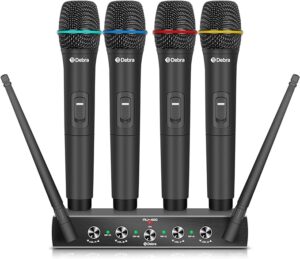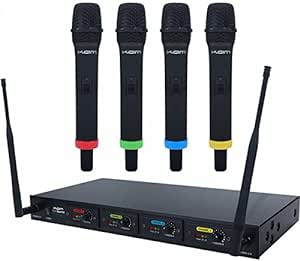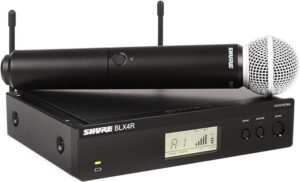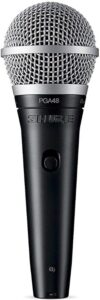The microphone, an indispensable tool in the karaoke setup, can greatly influence the overall experience. It serves as the bridge between the performer and the audience, transforming voice into music. In the realm of karaoke microphones, there exists a pivotal debate: whether to opt for wireless or wired microphones. Each choice comes with its distinct set of advantages and challenges, impacting aspects such as sound quality, ease of use, and freedom of movement.
Choosing the right microphone is crucial for an enhanced karaoke experience. While wired microphones might appeal to traditionalists or those with a keen eye on budget and reliability, wireless microphones offer unparalleled freedom and flexibility, making them a favorite among those who wish to move about freely as they perform. This decision can influence not just the performance quality but also the level of engagement and enjoyment of the participants.
As we delve deeper into this discussion, it’s important to consider various factors such as the venue, the audience, and the technical specifications that can sway your decision. The goal of this article is to navigate through the merits and demerits of both wireless and wired karaoke microphones, guiding you towards making an informed choice that enhances your karaoke sessions, making them unforgettable experiences.
Understanding Karaoke Microphones
In the world of karaoke, the term “karaoke microphone” generally refers to the use of dynamic microphones, which are favored for their durability, reliability, and ability to handle high sound pressure levels without distortion. Dynamic microphones are the workhorse of the microphone world, adept at capturing the spirited performances of karaoke singers without compromising on sound quality.
What Are Dynamic Microphones?
Dynamic microphones operate on the principle of electromagnetic induction. They are designed with a simple, rugged structure that includes a diaphragm attached to a coil of wire, placed within the magnetic field of a magnet. When sound waves hit the diaphragm, they cause it to vibrate, moving the coil within the magnetic field and generating an electrical current that mirrors the sound waves. This design makes them particularly well-suited for live performances, such as karaoke, where the microphone might be subjected to rough handling, loud singing, and varied environmental conditions.
The Role of Microphones in Karaoke Setups
In a karaoke setup, dynamic microphones serve several crucial roles:
- Sound Quality: They ensure that the vocal performance is captured with clarity and richness, providing a satisfying audio experience for both the singer and the audience. The natural sound reproduction of dynamic microphones makes them ideal for the wide range of vocal styles and music genres encountered in karaoke.
- Durability: Their robust construction means they can withstand the enthusiastic use common in karaoke settings, from accidental drops to the rigors of being passed around among numerous participants.
- Feedback Reduction: Dynamic microphones are less sensitive to background noise and feedback compared to other types, such as condenser microphones. This is essential in a karaoke environment, where speakers and singers are often in close proximity, and the risk of feedback is high.
- Ease of Use: They require no external power sources (like batteries or phantom power), making them plug-and-play devices that are easy for anyone to set up and use, regardless of technical expertise.
Dynamic microphones thus play a pivotal role in the karaoke experience, balancing sound quality with the practical needs of a live, often unpredictable, performance environment. Their ability to deliver consistent, high-quality audio while withstanding the demands of karaoke use makes them the go-to choice for both casual enthusiasts and professionals alike.
Wired Karaoke Microphones
Wired microphones, as the name suggests, connect directly to the audio system or amplifier through a physical cable. This traditional setup has been a staple in various audio environments, from live performances to studio recordings, and it remains a popular choice for karaoke due to its reliability and simplicity.

Description of Wired Microphones
Wired microphones for karaoke are typically dynamic microphones equipped with a cable that transmits the audio signal from the microphone to the sound system. The cable can vary in length, offering different degrees of mobility, but is generally long enough to allow the performer some freedom of movement. These microphones are designed to capture the voice clearly, converting sound waves into electrical signals without the need for complex electronics or digital processing.
Pros of Wired Karaoke Microphones
- Reliability: One of the most significant advantages of wired microphones is their reliability. With a direct physical connection, there’s less chance of signal interference from other electronic devices, ensuring a consistent and stable sound. This reliability is crucial in live performances like karaoke, where audio issues can disrupt the experience.
- Price: Wired microphones tend to be more affordable than their wireless counterparts. This price difference makes them an attractive option for karaoke venues or individuals on a budget. The lower cost also means it’s more feasible to have multiple microphones on hand, allowing for duets or group performances without a significant financial investment.
- No Need for Batteries or Recharging: Unlike wireless microphones, wired models don’t require batteries or periodic recharging. This can be a significant advantage in a busy karaoke setting, where managing and replacing batteries for multiple microphones could be inconvenient and costly over time.
Cons of Wired Karaoke Microphones
- Limited Mobility: The most apparent drawback of wired microphones is the restriction on movement caused by the cable. Singers are confined to the length of the cord, which can limit their ability to interact with the audience or move freely during their performance. This limitation can be particularly noticeable in larger venues or for performers who prefer to roam the stage.
- Setup and Cable Management: Using wired microphones can lead to challenges with cable management, especially in environments with multiple microphones or where the setup needs to be changed frequently. Cables can become tangled, pose a tripping hazard, and contribute to a cluttered appearance on stage. Moreover, the setup and teardown process can be more time-consuming, requiring careful handling of cables to prevent damage or wear over time.
In summary, wired karaoke microphones offer a reliable, cost-effective solution for karaoke enthusiasts and venues alike. While they provide excellent sound quality and are less prone to interference, the limitations in mobility and the challenges associated with cable management are important considerations. Choosing between wired and wireless options ultimately depends on the specific needs of the performer or venue, balancing the trade-offs between reliability, cost, and freedom of movement.
Wireless Karaoke Microphones
Wireless karaoke microphones offer performers the freedom to move without being tethered to a sound system by a cable. These microphones use radio frequency (RF) or digital signals to transmit audio wirelessly, providing a seamless connection between the microphone and the receiver connected to the audio system. This technology has revolutionized performances by eliminating physical constraints, allowing for more dynamic and engaging presentations.

Description of Wireless Microphones
Wireless microphones consist of two main components: the microphone itself, which contains a transmitter, and a separate receiver that captures the wireless signal and converts it back into audio. The absence of cables offers a cleaner look on stage and simplifies setup, particularly in larger venues or complex performances that involve significant movement. Wireless systems can vary in range, frequency stability, and signal clarity, with advancements in technology continually improving their performance and reliability.
Pros of Wireless Karaoke Microphones
- Mobility: The standout advantage of wireless microphones is the mobility they afford. Performers can move freely around the stage or venue without worrying about cable length or managing cords. This freedom enhances audience engagement and allows for more expressive performances.
- Aesthetic and Convenience: Wireless systems contribute to a cleaner stage setup by eliminating the clutter of cables. This not only improves the visual aspect of the performance space but also reduces the risk of tripping over wires, making it safer for performers and others moving around the stage. The ease of setup and teardown is another significant advantage, as it simplifies logistics and saves time.
Cons of Wireless Karaoke Microphones
- Price: The technology behind wireless microphones makes them more expensive than their wired counterparts. The initial investment includes not just the microphone but also the receiver and sometimes additional equipment to ensure a stable connection. For venues or individuals on a tight budget, this cost difference can be a significant consideration.
- Risk of Interference: Wireless systems are more susceptible to interference from other wireless devices, which can lead to signal dropouts or audio quality issues. Proper setup and frequency management are essential to mitigate these risks, especially in environments with multiple wireless devices.
- Battery Life: Wireless microphones require batteries or need to be recharged regularly, which can be inconvenient during long events or if the battery runs out unexpectedly. This necessitates careful planning and possibly having spare batteries or microphones on hand to avoid interruptions in the performance.
Wireless karaoke microphones represent a blend of technology and convenience, offering performers unparalleled freedom and reducing onstage clutter. However, the higher cost, potential for interference, and battery management are critical factors to consider. For many, the benefits of wireless systems—especially in terms of mobility and aesthetics—outweigh these drawbacks, making them a popular choice for modern karaoke experiences. Whether the choice leans towards wireless or wired depends on the specific needs, budget, and preferences of the user, as well as the logistical considerations of the performance environment.
Key Considerations for Choosing Between Wireless and Wired Microphones
When deciding between wireless and wired karaoke microphones, several factors come into play that can influence your choice. Understanding these considerations can help ensure that you select the best microphone for your needs, enhancing the karaoke experience for everyone involved. Here are the key factors to consider:
Sound Quality
- Wired Microphones: Traditionally, wired microphones have been praised for their superior sound quality, mainly due to a direct, uninterrupted signal path from the microphone to the audio system. This direct connection can result in clearer, more consistent audio reproduction with minimal latency.
- Wireless Microphones: Modern wireless microphones have made significant strides in sound quality, with many models offering audio fidelity that rivals wired counterparts. However, they can be more susceptible to interference, which might affect sound quality. Advanced models mitigate these issues with frequency agility and other technologies.
Range and Mobility Needs
- Wired Microphones: The range is limited to the length of the cable, restricting movement. For static performances or small venues, this limitation may not be an issue. However, for dynamic performances or when movement is essential, this can be a significant drawback.
- Wireless Microphones: Offer the freedom to move without the constraints of cables. This is ideal for interactive performances, large stages, or if the performer prefers to move around the audience. Consider the range of the wireless system to ensure it meets your needs, especially in larger venues.
Setup and Ease of Use
- Wired Microphones: Setup is generally straightforward, involving plugging the microphone into the sound system. However, cable management can be a concern, especially with multiple microphones or in larger setups, potentially complicating setup and teardown processes.
- Wireless Microphones: Require more initial setup to pair the microphone with the receiver and to ensure the selected frequency is clear of interference. Once configured, they offer a cleaner setup with less physical clutter. Managing battery life and ensuring all components are properly connected are additional considerations.
Budget
- Wired Microphones: Are typically less expensive than wireless options, making them a cost-effective choice for those on a tight budget or requiring multiple microphones.
- Wireless Microphones: The convenience and flexibility of wireless technology come at a higher price point. The investment includes not only the microphones but also receivers and potentially booster antennas or additional equipment for optimal performance.
Venue Size and Environment
- Wired Microphones: May be more suitable for smaller venues or environments where the microphone will be used in a fixed location. Cable length and potential trip hazards should be considered in relation to the venue size.
- Wireless Microphones: Are advantageous in larger venues or environments where the performer needs to move freely. The absence of cables can significantly enhance the aesthetics and safety of the performance area. It’s important to consider the potential for interference in environments with numerous wireless devices.
Choosing between wireless and wired karaoke microphones involves weighing these considerations based on your specific needs and circumstances. Whether prioritizing sound quality, mobility, ease of use, budget, or the characteristics of your venue, understanding these key factors will guide you to the most suitable microphone choice for your karaoke setup.
Use Cases: When to Choose One Over the Other
The choice between wired and wireless karaoke microphones often comes down to the specific use case and what you value most in your karaoke experience. Here’s a closer look at scenarios where one might be preferred over the other.
Wired Microphones for:
- Smaller Venues or Home Use: In more intimate settings or at home, where the performer doesn’t need to move much, wired microphones offer excellent sound quality without the need for mobility. The limited space makes cable management easier and the shorter distances ensure a stable connection.
- Budget-Conscious Buyers: If cost is a major consideration, wired microphones are generally less expensive than wireless options. They provide good sound quality and reliability at a fraction of the price, making them ideal for those who need to stretch their equipment budget further.
- Situations Requiring Uninterrupted Connectivity: For performances where reliability is paramount and there’s no room for signal interference or battery failure, wired microphones are a safer bet. They offer a stable, direct connection that ensures your voice is heard clearly and without interruption.
Wireless Microphones for:
- Large Venues or Professional Settings: When performing in larger spaces, the freedom to move around without worrying about tripping over cables becomes crucial. Wireless microphones allow performers to engage with the audience and utilize the entire stage, providing a more dynamic and interactive experience.
- Performers Who Interact Closely With the Audience: If your performance style involves moving among the audience or you like to involve them directly in your act, wireless microphones offer the flexibility and range of motion needed to do so effectively. This ability to interact without restraint can elevate the performance and audience engagement.
- Users Prioritizing Convenience and a Clean Setup: For those who value a streamlined setup and the aesthetic appeal of a stage without visible cables, wireless microphones are the way to go. They reduce clutter, minimize setup and teardown time, and eliminate the hazards and limitations associated with cables.
Ultimately, the decision between using a wired or wireless karaoke microphone hinges on the specific demands of your performance environment and personal preference. Wired microphones, with their reliability and cost-effectiveness, are well-suited for static performances and smaller, intimate settings. In contrast, wireless microphones, despite their higher cost and potential for interference, offer unparalleled freedom and flexibility, making them ideal for larger venues and performers who prioritize mobility and interaction. By considering these use cases, you can make an informed choice that best suits your karaoke needs, ensuring a seamless and enjoyable singing experience for both performers and audiences alike.
Our Picks for Karaoke Microphones
Whether you’re setting up a home karaoke system or looking for the best options for professional use, choosing the right microphone can significantly impact the experience. Here’s a breakdown of our top picks for both wireless and wired karaoke microphones, categorized by budget, mid-tier, and high-quality options.
Wireless Karaoke Microphones
Budget Microphone:

Debra Audio AU400 Wireless Microphone
A cost-effective solution for those who want the freedom of wireless technology without breaking the bank. Ideal for casual karaoke sessions and small gatherings.
Mid Tier Quality:

KAM KWM Quartet Wireless Microphone
This set offers a great balance between quality and price. It’s suitable for more serious karaoke enthusiasts or smaller venues looking for reliable wireless performance.
High Quality:

Shure BLX24R/SM58 Wireless Microphone
For the ultimate in sound quality and reliability, the Shure BLX24R/SM58 stands out. It’s perfect for professional settings or anyone seeking top-tier audio performance in their karaoke setup.
Wired Karaoke Microphones
Budget Microphone:

Behringer SL 85S Dynamic Cardioid Microphone
An excellent choice for karaoke on a budget, offering clear sound quality and durability at an affordable price point. Ideal for home use or small events.
Mid Tier:

Shure PGA48-QTR-E Microphone
A solid option for those looking to step up their karaoke game. The Shure PGA48-QTR-E combines affordability with enhanced sound quality for more serious singers.
Top Tier:

Shure Beta 58A Microphone
Renowned for its exceptional sound clarity and durability, the Shure Beta 58A is suited for professional karaoke setups or individuals demanding the highest quality audio performance.
Each of these options has been selected to cater to different needs and budgets, ensuring that whether you’re a casual enthusiast or a professional, there’s a microphone that fits your requirements. From the budget-friendly Debra Audio AU400 to the professional-grade Shure BLX24R/SM58 and Beta 58A, these picks represent a range of what’s available in the current market, providing both quality and value across the spectrum.
Final Thoughts
In our exploration of karaoke microphones, we’ve delved into the nuances between wireless and wired options, offering insights into each type’s distinct advantages and challenges. From the unparalleled mobility and convenience of wireless microphones to the reliability and cost-effectiveness of wired models, the choice is far from straightforward and depends heavily on individual preferences, performance needs, and the specific context in which the microphone will be used.
Key Points Recap:
- Wired Microphones are lauded for their sound quality, reliability, and affordability. They are an excellent choice for smaller venues or home use, where movement is limited, and budget constraints are a consideration.
- Wireless Microphones offer freedom of movement and a clean aesthetic, reducing the risk of tripping over cables and allowing performers to engage more dynamically with their audience. They are well-suited for larger venues and performers who prioritize mobility and interaction.
- We’ve also highlighted our top picks for karaoke microphones across different budget ranges, from budget-friendly options to professional-grade choices, ensuring there’s something for everyone, whether you’re just dipping your toes into the world of karaoke or looking to elevate an existing setup.
The decision between wireless and wired karaoke microphones should be informed by a thorough consideration of your specific needs and circumstances. Sound quality, range and mobility, setup and ease of use, budget, and venue size all play critical roles in this choice.
We encourage readers to weigh both options’ advantages and disadvantages carefully before making a decision. Think about how each microphone’s characteristics align with your karaoke setup’s requirements and your personal preferences. Remember, the goal is to enhance your karaoke experience, ensuring it is as enjoyable and seamless as possible for both performers and audiences alike.
Ultimately, whether you choose a wired or wireless microphone, the joy of singing and sharing music remains unchanged. By selecting the microphone that best suits your needs, you can ensure that every performance is delivered with clarity and confidence, making every karaoke session a memorable one.








